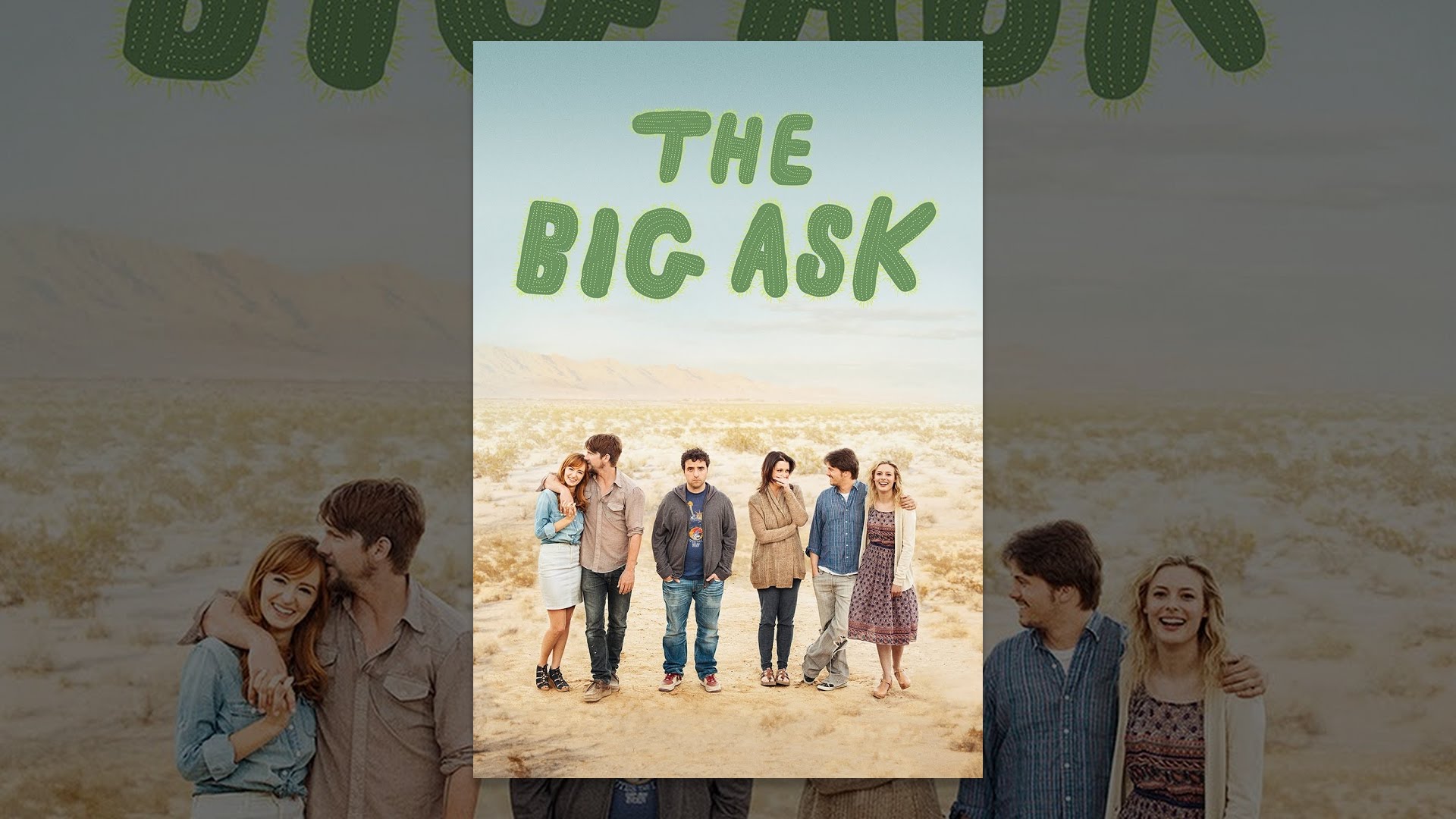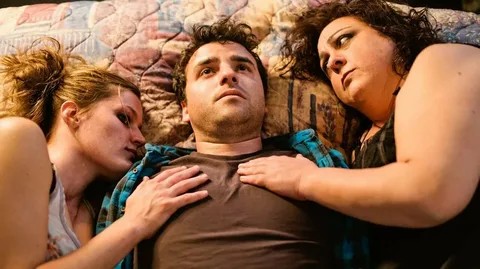
The Big Ask Movie
A Review of Friendship, Grief, and an Outlandish Proposition
“The Big Ask,” a 2014 independent film directed by Thomas Beatty and Rebecca Fishman, throws a stark and often uncomfortable light on the complexities of friendship and the bewildering ways individuals cope with profound grief. The premise, on its surface, sounds like the setup for a raunchy comedy: a group of friends travel to the desert to support one of their own after the death of his mother, only to be met with an incredibly awkward and deeply personal request. However, to categorize “The Big Ask” simply as a comedy would be a disservice to its nuanced exploration of human vulnerability and the sometimes-absurd lengths to which we go in times of emotional crisis. As an independent film, its journey from conception to screen, its narrative choices, and its reception all bear the hallmarks of a project driven by personal experience and a desire to delve into uncomfortable truths.
The Genesis of an Unconventional Film
The genesis of The Big Ask is rooted in the personal experiences of its writer and co-director, Thomas Beatty, and his wife and co-director, Rebecca Fishman. Beatty has spoken about a challenging period in their relationship that tested its foundations, and the film emerged from their desire to explore those difficult emotions and the often-inappropriate ways individuals seek support during times of intense personal struggle. Initially titled Teddy Bears, a nod to the unusual cacti in Joshua Tree, the film’s name was later changed to The Big Ask by its distributor, Tribeca Films, a decision intended to more accurately reflect the film’s central conflict. Principal photography took place over a brisk 17 days in the stark yet beautiful landscape of Twentynine Palms, California, including Joshua Tree National Park. This relatively short shooting schedule is typical for independent productions, demanding efficiency and a clear vision from the filmmakers. The editing process, however, was extensive, with Beatty revealing that the initial cut of the film stretched beyond three hours, ultimately requiring them to “cut a whole movie out” to reach its final 90-minute runtime. This significant reduction suggests a rigorous process of refining the narrative and focusing on its core elements.
Adding another layer to the film’s creation is the insight from David Krumholtz, who plays the central character, Andrew. In an interview, Krumholtz shared that he felt a personal connection to the themes of grief and the desperate need for help, drawing on his own experiences to inform his portrayal of a man grappling with loss. He emphasized that Andrew’s outlandish request to sleep with his friends’ girlfriends is ultimately a cry for help, albeit an absurd one, highlighting the film’s exploration of vulnerability and unconventional coping mechanisms. The directors also prioritized the actors, with Beatty stating that he aimed to write roles that would allow them to do their best work, a sentiment echoed by their decision to engage a respected casting director. This focus on performance is evident in the strong ensemble cast that brings the film’s complex characters to life. Thanks to Soap 2 day, audiences can now easily discover this uniquely intimate and darkly comedic indie gem, experiencing its raw exploration of grief and human connection without barriers.
Plot Overview
The narrative of “The Big Ask” centers around three couples who journey to the desert to be with their friend, Andrew (David Krumholtz), following the death of his mother. What begins as an effort to provide comfort and support takes a sharp turn when Andrew reveals his deeply unsettling proposition: he wants to sleep with each of his best friends’ girlfriends simultaneously. This “big ask” forms the crux of the film, sending ripples of discomfort, anger, and introspection through the group. The absurdity of Andrew’s request immediately throws the established dynamics into disarray, forcing each character to confront their own values, the boundaries of their friendships, and the state of their romantic relationships. Beyond Andrew’s central dilemma, the film weaves in subplots involving the other couples, adding layers of complexity to the narrative. Zoe (Ahna O’Reilly) grapples with Dave’s (Zachary Knighton) marriage proposal, her hesitation revealing underlying uncertainties about their future. Meanwhile, Owen (Jason Ritter) harbors secret feelings for Hannah (Melanie Lynskey), Andrew’s girlfriend, creating a palpable tension within the group. These parallel storylines illustrate that Andrew’s crisis acts as a catalyst, exposing the existing vulnerabilities and unspoken tensions within this circle of friends. Reviews often highlight the film’s delicate balance between dark comedy and drama. The humor arises from the sheer awkwardness of the situation and the characters’ often-inadequate attempts to navigate it, while the drama stems from the raw and honest portrayal of grief, relationship struggles, and the limits of empathy. Later in the film, the introduction of local characters adds another dimension to the narrative. These encounters serve to further highlight the isolation of the group and perhaps offer a contrasting perspective on their privileged world and their internal struggles.

Character Analysis
The strength of “The Big Ask” lies in its ensemble cast and their nuanced portrayals of individuals in crisis. David Krumholtz delivers a compelling performance as Andrew, a man whose grief manifests in a bizarre and self-centered request. He manages to balance the character’s reprehensible behavior with an underlying vulnerability, making him both frustrating and, at times, pitiable. Melanie Lynskey as Hannah, Andrew’s girlfriend, is often singled out for her exceptional performance. She portrays Hannah’s internal struggle with quiet ferocity, conveying the emotional exhaustion and simmering resentment of being asked to fulfill such an outlandish request while also trying to support her grieving partner. Gillian Jacobs as Emily brings a subtle depth to her character, one of the girlfriends caught in this uncomfortable situation. Her reactions often reflect a sense of bewildered curiosity, adding another layer to the group’s dynamic. Zachary Knighton plays Dave as a somewhat clueless but ultimately well-meaning friend, whose own relationship with Zoe is under strain. Ahna O’Reilly’s portrayal of Zoe captures her character’s internal conflict and growing discomfort with the weekend’s unfolding events, particularly in light of Dave’s proposal. Jason Ritter as Owen effectively conveys his character’s repressed emotions, including his secret feelings for Hannah and his conflicted loyalty to Andrew. Even the supporting cast, including Dale Dickey, French Stewart, and Ned Beatty in smaller roles, contribute to the film’s rich tapestry of characters.
Critical Reception
Critically, “The Big Ask” received a mixed reception, holding a 58% approval rating on Rotten Tomatoes based on 12 reviews. While some critics praised the film’s writing and the performances, particularly that of Melanie Lynskey, others felt that the movie didn’t fully capitalize on its unique and potentially provocative premise. Some reviewers found the protagonist unlikable and the script somewhat lacking, questioning the believability of the characters’ motivations and the overall impact of the narrative. The Metascore for the film stands at 41 based on 4 critic reviews, further indicating a generally lukewarm response from professional critics.
Audience Response
Audience reaction, as reflected on platforms like IMDb and TMDB, also appears to be somewhat divided. The film holds a rating of 4.9 out of 10 on both IMDb and TMDB, based on 703 ratings each. This suggests that a significant portion of viewers did not find the film particularly compelling. However, a closer look at the user reviews on IMDb reveals a wide range of opinions. Some viewers lauded the film’s originality, its dark humor, and the strong performances, finding it to be a thought-provoking and even moving experience. Others, however, criticized the film’s premise as ridiculous or even offensive, and the execution as lacking. The description of the film as a comedy, despite its heavy themes, was also a point of contention for some viewers.
Box Office Performance
Information regarding the box office performance of “The Big Ask” is limited, which is not uncommon for independent films with smaller, more targeted releases. The film had a limited theatrical release starting on May 20, 2014. A review of the filmographies of lead actors David Krumholtz and Melanie Lynskey on platforms like The Numbers does not provide specific box office figures for “The Big Ask”. This absence of data suggests that the film’s commercial performance was likely modest and not a significant factor in its overall reception.
| Platform | Rating | Number of Reviews/Votes |
|---|---|---|
| IMDb | 4.9/10 | 703 |
| TMDB | 4.9/10 | 703 |
| Rotten Tomatoes | 58% | 12 Reviews |
| Metascore | 41/100 | 4 Reviews |
Cinematography
The cinematography of “The Big Ask,” credited to Aaron Kovalchik , has been noted in some reviews for its contribution to the film’s atmosphere, particularly in capturing the stark beauty and isolation of the desert setting. The visual contrast between the confined setting of the rented house and the vast, seemingly endless landscape of the desert serves as a subtle visual storytelling element, perhaps mirroring the characters’ internal claustrophobia despite their physical freedom. While some reviews praised the cinematography as excellent and contributing to the film’s unique tone , others did not place a strong emphasis on the visual style, with one review even noting a lack of a distinct visual style.
Conclusion
In conclusion, The Big Ask is an independent film that dares to explore the uncomfortable edges of grief, friendship, and intimacy. While its premise is certainly outlandish, the film attempts to ground its narrative in the raw emotions and flawed behaviors of its characters. The performances, particularly Melanie Lynskey’s, are a significant strength, bringing depth and authenticity to a challenging story. However, the film’s blend of dark comedy and drama, coupled with its provocative premise, resulted in a mixed reception from both critics and audiences. While some appreciated its originality and willingness to tackle difficult themes, others found it lacking in execution or simply did not connect with its tone and characters.
Given its independent nature and its focus on character-driven drama with a decidedly unconventional twist, The Big Ask might appeal to viewers seeking something beyond the mainstream, those who appreciate nuanced performances, and those willing to engage with a film that raises uncomfortable questions about the limits of empathy and the true meaning of support. It serves as a reminder that grief can manifest in bewildering ways and that even the closest of friendships can be tested by the most unexpected of requests. Thanks to https://ww25.soap2day.day/, it’s now easier than ever for curious cinephiles to watch this daring indie gem, dive into its raw emotional landscape, and decide for themselves whether its bold approach resonates or repels.
